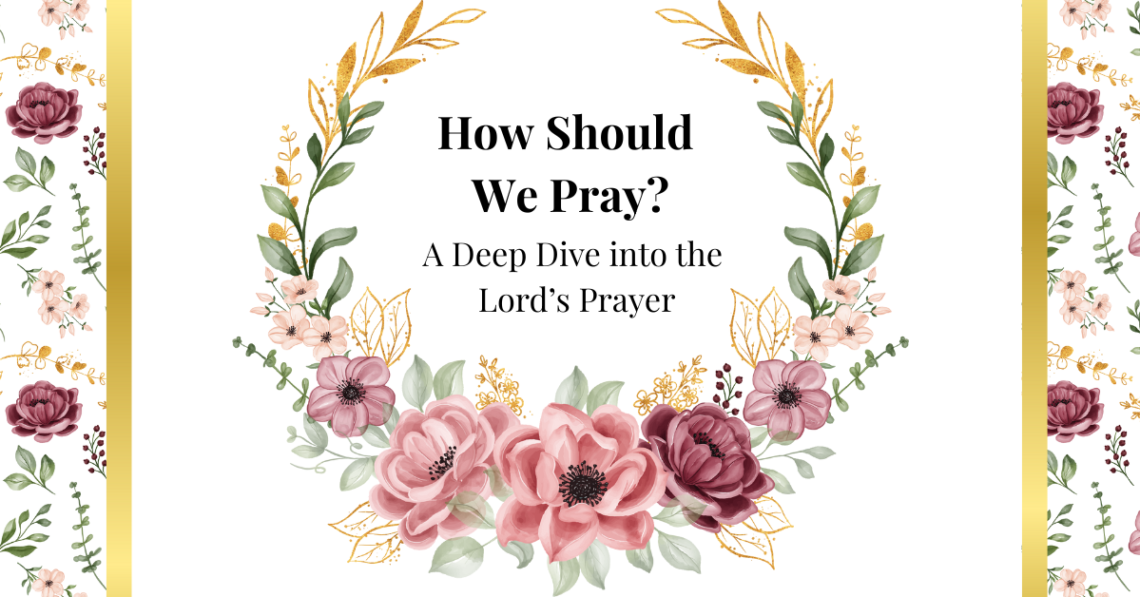Prayer is a vital part of the Christian walk. It’s how we communicate with God, seek His will, and grow in our relationship with Him. The Lord’s Prayer, given by Jesus in Matthew 6:9-13, is often considered the perfect model for how we should pray. It is not only a prayer we can recite, but a framework to guide our own prayers.
In this blog post, we’ll explore each section of the Lord’s Prayer in detail and learn how we can apply it to our own prayer lives.
“Our Father in heaven, hallowed be your name.”
Approach God with Reverence and Worship
The Lord’s Prayer begins by acknowledging God as our Father. This is significant because it invites us into an intimate relationship with God—He is not distant or far away, but our loving Father. When we pray this, we are recognizing that God has adopted us into His family through Christ.
The phrase “in heaven” reminds us of God’s supreme authority. He is not bound by time or space, and His reign is eternal. The Lord’s Prayer then declares “hallowed be your name,” which means that we treat God’s name as sacred, holy, and set apart. This is an act of worship. When we pray, we should start by focusing on God’s greatness and holiness, giving Him the honor He deserves.
Application:
- Before diving into personal requests, begin by adoring God. Praise Him for who He is—His holiness, power, and love.
- Let this section remind you to keep your focus on God’s greatness in the midst of all the challenges you face.
“Your kingdom come, your will be done, on earth as it is in heaven.”
Submit to God’s Will
This portion of the prayer teaches us to align our hearts with God’s will. We are praying for God’s kingdom to come, which refers to His reign over all creation, both now and in the future. This is a prayer for God’s rule to be recognized and established on earth, in our lives, and in the world. We ask for the fulfillment of His perfect plans.
The phrase “your will be done” is a powerful reminder that our will must take a backseat to God’s. As much as we may have our own plans, we must yield to God’s perfect wisdom. This is a surrendering of our desires and an invitation for God to use us according to His purposes.
Application:
- Start your prayer with a heart that desires God’s will over your own. Pray for guidance and wisdom to live according to His will.
- In challenging situations, pray that God’s kingdom might come to those areas and that His purposes will be accomplished through you.
“Give us today our daily bread.”
Depend on God for Provision
Here, Jesus teaches us to pray for our daily needs—physical, emotional, and spiritual. “Daily bread” represents more than just food. It’s a symbol for everything we need to live. This part of the prayer encourages us to trust God daily for provision. It acknowledges that we are not self-sufficient and that every good gift comes from God.
When we pray this, we are reminding ourselves that God is our provider, and He will give us what we need for today. We are not to worry about tomorrow, but to trust Him in the present moment.
Application:
- Ask God for provision in all areas of your life: financial, relational, emotional, and spiritual.
- Trust God to provide and remember that it’s okay to ask Him for help with what you need each day.
“Forgive us our debts, as we also have forgiven our debtors.”
Seek Forgiveness and Extend It
In this part of the prayer, we acknowledge our need for forgiveness. We are asking God to forgive our sins, recognizing that we fall short of His holiness. However, this petition also comes with a condition: “as we have forgiven our debtors.” We are called to extend forgiveness to others as God has extended forgiveness to us.
This reflects the principle that God’s forgiveness is both a gift and a responsibility. If we are unwilling to forgive others, how can we expect God to forgive us? Jesus makes it clear in the Gospel that our willingness to forgive others is directly tied to experiencing God’s forgiveness in our own lives.
Application:
- Regularly reflect on the areas where you need to ask God for forgiveness.
- Be intentional about forgiving others, even when it’s difficult. Pray for the strength to release bitterness and choose forgiveness.
“And lead us not into temptation, but deliver us from the evil one.”
Request for Protection
In this final petition, we ask God for protection from both temptation and evil. The world we live in is filled with challenges that can pull us away from God. Temptation to sin is everywhere, and the evil one (Satan) seeks to destroy our faith and relationship with God.
When we pray this, we are asking God to guide us in a way that leads us away from sin. We seek His strength to resist the pull of temptation and His deliverance from evil forces. This section reminds us that we are not in this battle alone. God is our protector and deliverer.
Application:
- Ask God for help in resisting temptation. Be specific about the areas where you struggle.
- Pray for protection for yourself, your loved ones, and your community against the influence of the enemy.
“For yours is the kingdom and the power and the glory forever. Amen.”
End with Praise and Affirmation
The Lord’s Prayer closes with a doxology—a declaration of God’s sovereignty, power, and glory. When we pray, we acknowledge that God is in control, that His kingdom will last forever, and that all power belongs to Him. This is a declaration of faith in God’s eternal reign.
The word “Amen” means “so be it” or “let it be.” It affirms our trust in God’s ability to answer our prayers according to His perfect will. Ending the prayer with praise reminds us of God’s greatness and helps us finish our prayers with gratitude and confidence.
Application:
- Conclude your prayer by praising God for His power, His sovereignty, and His eternal reign.
- Remember that your prayers are heard by a loving and powerful Father who has the ultimate authority.
Conclusion: A Blueprint for Prayer
The Lord’s Prayer is more than just a prayer we recite; it’s a blueprint for how to pray. Each section teaches us how to approach God with reverence, submit to His will, trust in His provision, seek forgiveness, ask for protection, and end with praise.
As you incorporate the Lord’s Prayer into your own prayer life, let it serve as a guide for your conversations with God. Whether you pray it word-for-word or use it as a model, let it shape the way you communicate with the One who loves you and holds all things together.
What part of the Lord’s Prayer resonates with you most? How can you apply it to your daily prayers? Share your thoughts in the comments below!





